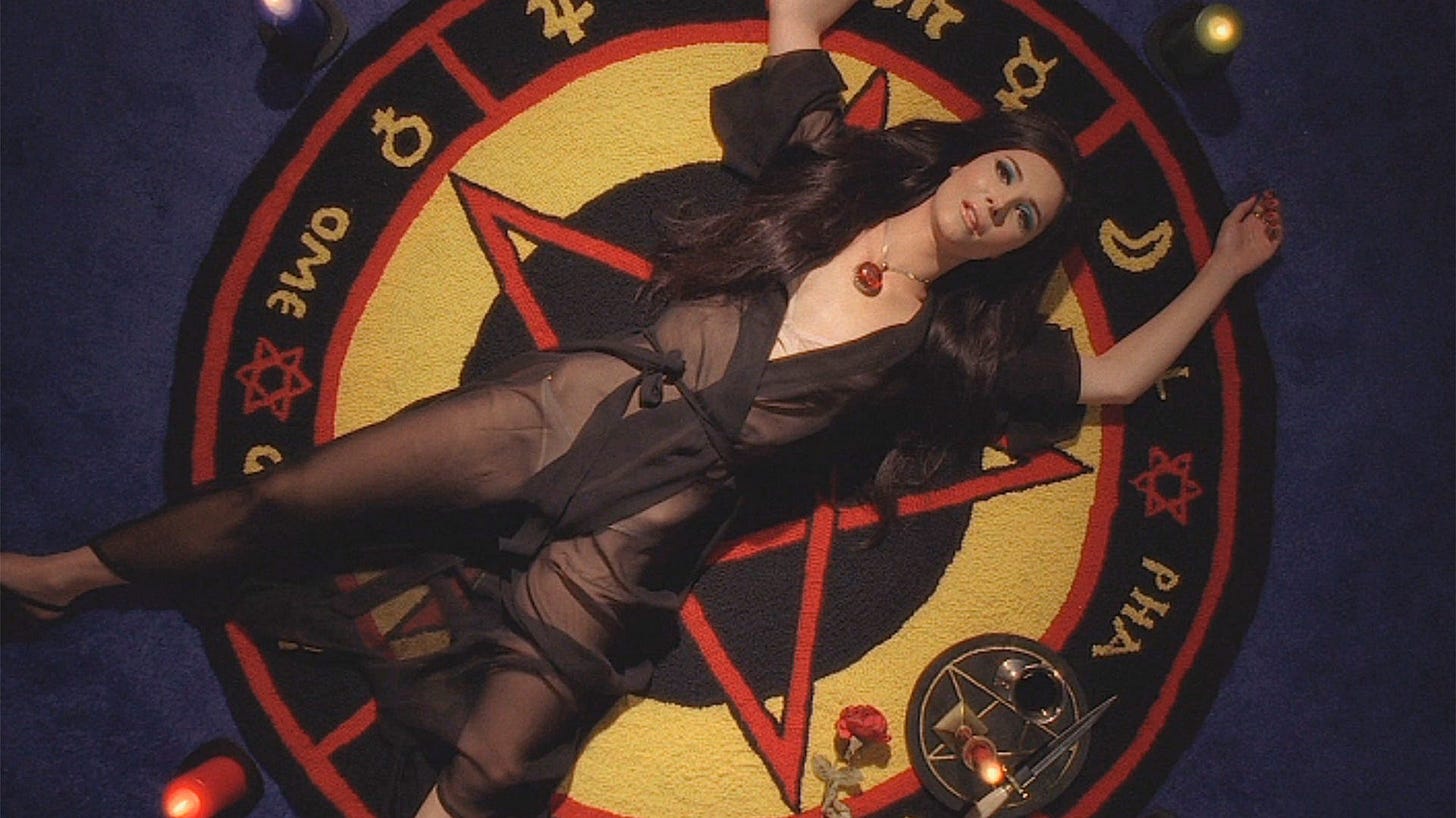I have a particular love for the films of the seventies, an era in which I wish I lived. For some reason, if I’m not going to watch something new, then I want it to be from that decade, in a way I can’t articulate. The formalism of the 40’s and 50’s had been dissipating heavily through those decades, and we were seeing the first, rather unhinged sensibilities of the independent and experimental film scene begin to flower within the mainstream. Any film that attempts to recreate that is a-ok in my book, though obviously, easier said than done.
Well, Anna Biller gets an A+ for that particular assignment with her second film, “The Love Witch”. This is a subtly feminist take on sexploitation films of the late sixties and early seventies and the cultural interest in the occult that powered the narrative engines of several pictures of the era. This is not some sort of grindhouse pastiche, but an actual academic recreation of films of that era, particularly considering many movies of this particular ilk were slow and somewhat absent of incidence. So while there is a linear plotline to this film, the story freely slows down to observe and pursue each odd member of a colorful cast.
The arc of this particular storyline is familiar. Elaine is a no-doubt witch settling in a new town and turning heads, even as locals prick up at the story of her late husband. Men immediately follow her, men with mustaches and tweed jackets. Handsome Ron Burgundys. When I say the difference is subtle between this movie and other films of the era, I’m largely speaking of the power dynamic. Often a character like her, bewitching all the men around, would receive a comeuppance – there would be a savage torture/death, or the camera would clearly employ a male gaze that would objectify her, breaking her physicality apart to spotlight her not as a person but a set of assets.
Here, that is never the issue. An assembly line of Burgundys audition to be her next lover, and each one is punished by death. There is little suspense, it is mostly about the rituals of how she eliminates these men, with potions and curses and… maybe ennui? There’s a little bit of Douglas Sirk melodrama as far as this movie goes, a lot of gorgeous period-specific wardrobe worn by leggy women and blocky oblong men. If you never cottoned to films like this, of that era, this may not be your jam. But this isn’t some dry cinematic essay either, and star Samantha Robinson has a timeless beauty that forces you to keep your eyes to the screen.
I had to look up Biller, who has a background in both film and literature. Wouldn’t you know it, she’s been with novelist Robert Greene for over a decade now. Greene would be deeply familiar to anyone who has been down for a long time. Greene penned “The 48 Laws Of Power”, unquestionably one of the most widely-read books in prison while I was down. For those who are unfamiliar, yes it is something of a guide to life for those seeking a more assertive lifestyle (interpreted by those in prison as power and money). You didn’t have to look far to find a copy.
While I was down, I would see some of the same books. Greene’s book was often nestled into a mini-library in someone’s locker next to a Bible or Quran. You know what book popped up regularly, though? “Think And Grow Rich” by Napoleon Hill. It’s another how-to, ostensibly about power. Mostly by men thinking there was a shortcut to riches. But the common thread in these books is about control. Men with no control in an environment of oppression seeking to maintain whatever control they can. The question that any onlooker has to ask is, are these men in prison because of a lack of discipline, or do they BELIEVE they’re in prison because of a lack of discipline? Whatever the case, there is a hunger for individual responsibility, prescribed by Robert Greene or someone else.
Why don’t prisons take advantage of this? Why don’t they find ways to teach this discipline to men with messy lives? And why don’t they teach them that it’s not about chasing a dollar, particularly easy money? You don’t need to be a behavioral scientist to notice these things. You just need to know how men in these situations react. Maybe classes on managing a home and paying for it. Maybe classes on getting a job, keeping it, and working your way up a system. Maybe a class about banking. All this would go a long way, but I’ve never seen any class remotely like that. You’d think that would be worth chasing for a place daring to call itself a Correctional Facility. You’d think a lot of things.







I just put this movie on my list to watch. The look however is very 70s, but i keep finding that it was released in 2016!? i love to see filmmakers pay homage to decades past and the styles of films that paved the way for more filmmakers. Thanks for the rec.